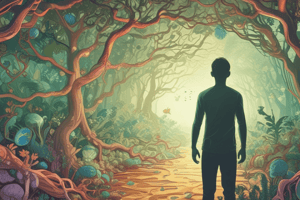Podcast
Questions and Answers
Who is credited with inventing the microscope and discovering the microbial world?
Who is credited with inventing the microscope and discovering the microbial world?
- Edward Jenner
- Antony van Leeuwenhoek (correct)
- Robert Koch
- Louis Pasteur
Louis Pasteur is known as the Father of Modern Microbiology.
Louis Pasteur is known as the Father of Modern Microbiology.
True (A)
The basic structural, functional, and biological unit of all known living organisms is the __________.
The basic structural, functional, and biological unit of all known living organisms is the __________.
cell
Match the important people with their contributions:
Match the important people with their contributions:
Flashcards are hidden until you start studying
Study Notes
Introduction to Microbiology
- Microbiology is the study of microorganisms that are too small to be seen by the naked eye.
- The term "microbiology" comes from Greek words: "micro" means small, "bios" means life, and "logos" means knowledge.
Discovery of Microbes and the Dawn of Microbiology
- The term "microbiology" was coined by French chemist Louis Pasteur (1822-1895).
- Microbiology has its roots in the biological sciences expansion and development after 1850.
- The term "microbe" was first used by Sedillot in 1878.
The Discovery Era
- Antony van Leeuwenhoek (1632-1723) invented the microscope and discovered the microbial world.
- During the 17th-18th centuries, scientists believed in spontaneous generation, where living organisms can develop from non-living matter.
- Edward Jenner discovered smallpox in 1796-1798.
- Louis Pasteur is considered the founder of modern microbiology (1861).
- Joseph Lister performed the first antiseptic operation in 1865.
- Gregor Mendel published the laws of heredity in 1866.
- Robert Koch, the father of medical microbiology, discovered pure culture in solid media and made other significant contributions between 1876-1883.
Classification of Microorganisms
- The 5 major groups of microorganisms are: bacteria, algae, fungi, protozoa, and viruses.
Cell Biology
- The cell is the basic structural, functional, and biological unit of all known living organisms.
- The cell was discovered by Robert Hooke in 1665.
- Cells are the smallest unit of life that can replicate independently and are often called the "building blocks of life".
Important People and Their Contributions
- Edward Jenner: discovered smallpox.
- Louis Pasteur: founder of modern microbiology, antiseptic approach.
- Joseph Lister: performed the first antiseptic operation.
- Gregor Mendel: published laws of heredity.
- Robert Koch: father of medical microbiology, discovered pure culture in solid media, and made other significant contributions.
Studying That Suits You
Use AI to generate personalized quizzes and flashcards to suit your learning preferences.




